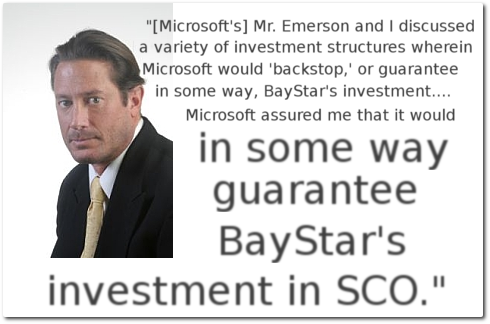04.01.16
Posted in GNU/Linux, IBM, Microsoft, SCO, UNIX at 2:18 pm by Dr. Roy Schestowitz
English/Original
Publicado en GNU/Linux, IBM, Microsoft, SCO, UNIX at 12:26 pm por el Dr. Roy Schestowitz

See Lawrence R. Goldfarb (Wikipedia)
Sumario: el caso SCO no ha acabado todavía, y permanece no claro quié esta subsidiando el caso
El caso SCO “se levanta de la tumba de nuevo,” dice hoy el titular de los medios Británicos (que lanzaron la historia). Esta historia que podría ser del 2009, 2010 y todo hasta el 2016. Nunca acaba. ¿De dónde viene el financiamiénto?
“Bueno, SCO levanta de la tumba o tal vez la información no era exacta. Se nos ha dicho esto durante 7 años y hasta hace 2 meses nosotros dudamos que esto fue el final de todo.”Bueno, SCO levanta de la tumba o tal vez la información no era exacta. Se nos ha dicho esto durante 7 años y hasta hace 2 meses nosotros dudamos que esto fue el final de todo. La razón que relmente no creímos que es el final de toda esa litigación es todo ese modelo de Groklaw (o medios citando Groklaw) de decir que estaba lejos de terminar. Groklaw todavía esta publicando PDFs que se relacionan a este caso y medios Británicos los citan (sabiéndo magicamente donde estos documentos están). Para citar a The Inquirer: “En un comunicado, el juez David Nuffer argumentó que “la naturaleza de las reclamaciones son tales que ninguna corte de apelación tendría que decidir los mismos problemas más de una vez si había alguna posteriores recursos”, efectívamente sugiriéndo que el caso tiene para rato.
“El 1 de marzo, que la presentación fue respaldada por una explicación completa del juez, declarando vencedor IBM enfático en la larga saga.”
“Se ordena y se adjudicó que de acuerdo con las órdenes del tribunal presentó el 10 de julio, 2013 5 de febrero de 2016, y 8 de febrero, 2016, se dictó sentencia a favor del acusado y las causas de los demandantes de acción son despedidos con prejuicio” se indica en el documento.”
“Para implementar exitósamente E.E.E. algo que debes dar es la impresión de buenas intenciones.”“Ahora, sin embargo, SCO se ha presentado una vez más para apelar la sentencia aunque, con precisión los motivos que aún reclaman no se han dado a conocer.”
También afirma que “no es claro quién continúa financiando el caso.” Bueno, talvez pregunten eso a Microsoft. Insiste que todavía “ama a Linux” mientras al mismo tiempo saca un E.E.E. sobre el (incluso hace unas horas). Para implementar exitósamente E.E.E. algo que debes dar es la impresión de buenas intenciones. █
“…Microsoft quiso promover a SCO y su juicio pendiente contra IBM y el sistema operativo Linux. Pero Microsoft no quiso ser visto como atacando IBM o Linux.”
–Larry Goldfarb, BayStar, accionista clave en SCO abordado por Microsoft
Permalink
 Send this to a friend
Send this to a friend
03.30.16
Posted in GNU/Linux, IBM, Microsoft, SCO, UNIX at 12:26 pm by Dr. Roy Schestowitz

See Lawrence R. Goldfarb (Wikipedia)
Summary: SCO case not over yet, and it remains unclear who’s still subsidising the case
The SCO case “rises from the grave again,” says today’s headline from the British media (which broke the story). This story looks like it could be from 2009, 2010 and all the way to 2016. It just never ends. Where does the funding even come from?
“Well, SCO rises from the grave or maybe the reporting was just not accurate. We have been told this for 7 years and even 2 months ago we doubted this was the end of it all.”Well, SCO rises from the grave or maybe the reporting was just not accurate. We have been told this for 7 years and even 2 months ago we doubted this was the end of it all. The reason we didn't really believe it's the end of all that litigation is Groklaw’s pattern (or media quoting Groklaw) of stating it’s all pretty much over. Groklaw is still uploading PDFs which relate to this case and British media cites them (magically knowing where files are located). To quote The Inquirer: “In a filing, Judge David Nuffer argued that “the nature of the claims are such that no appellate court would have to decide the same issues more than once if there were any subsequent appeals”, effectively suggesting that the case had more than run its course.
“On 1 March, that filing was backed up by the judge’s full explanation, declaring IBM the emphatic victor in the long-running saga.
“”IT IS ORDERED AND ADJUDGED that pursuant to the orders of the court entered on July 10, 2013, February 5, 2016, and February 8, 2016, judgment is entered in favour of the defendant and plaintiff’s causes of action are dismissed with prejudice,” stated the document.
“To successfully E.E.E. something you must give the impression of good intentions.”“Now, though, SCO has filed yet again to appeal that judgment, although the precise grounds it is claiming haven’t yet been disclosed.”
It also states that “it’s unclear who continues to bankroll the case.” Well, maybe ask Microsoft. It insists that it “loves Linux” while pulling an E.E.E. on it (even just a few hours ago). To successfully E.E.E. something you must give the impression of good intentions. █
“…Microsoft wished to promote SCO and its pending lawsuit against IBM and the Linux operating system. But Microsoft did not want to be seen as attacking IBM or Linux.”
–Larry Goldfarb, BayStar, key investor in SCO approached by Microsoft
Permalink
 Send this to a friend
Send this to a friend
12.10.13
Posted in BSD, UNIX at 3:11 pm by Dr. Roy Schestowitz

Summary: FreeBSD believes that the NSA tampered with hardware-level random number generators
LINUX may have been made vulnerable by the NSA et al. [1, 2, 3, 4]. There are a lot of speculations and even active discussions about random number generation in Linux, especially as implemented in hardware (e.g. by Intel). Without sufficiently high entropy in random number generators, not only would Linux as a kernel be vulnerable; SSL and SSH too would suffer.
Some of these issues we have covered here before, noting that Red Hat works a little too closely with the NSA. Right now we are quite fascinated by the news [1,2] that FreeBSD won’t use Intel’s and Via’s hardware random number generators. Why? NSA.
In other news about FreeBSD, version 10 is approaching [3,4] after 20 years of development and it should have better graphics support [5]. Marking yet more milestones, the operating system “Is Getting Into The Magazine Business” [6], it runs in the record-breaking [7] PS4 (in some sense [8]). and it should be released some time this month [9]. FreeBSD is not the only BSD game in town (DragonFlyBSD gets some attention [10,11]), but it it the leading among the BSDs, so its voice when it comes to privacy and security issues sure counts. █
Related/contextual items from the news:
-
-
Developers of the FreeBSD operating system will no longer allow users to trust processors manufactured by Intel and Via Technologies as the sole source of random numbers needed to generate cryptographic keys that can’t easily be cracked by government spies and other adversaries.
The change, which will be effective in the upcoming FreeBSD version 10.0, comes three months after secret documents leaked by former National Security Agency (NSA) subcontractor Edward Snowden said the US spy agency was able to decode vast swaths of the Internet’s encrypted traffic. Among other ways, The New York Times, Pro Publica, and The Guardian reported in September, the NSA and its British counterpart defeat encryption technologies by working with chipmakers to insert backdoors, or cryptographic weaknesses, in their products.
-
The final beta build ahead of the long-awaited and delayed FreeBSD 10.0 has now been made available.
-
-
The latest FreeBSD code (for 10.0) supports not only Intel KMS but also the open-source AMD Radeon driver ported from the Linux kernel. This Intel/Radeon KMS support has since trickled into DragonFlyBSD and other BSD platforms. However, not all is up to par when it comes to graphics support on FreeBSD. Here’a a road-map and test matrix with some other items still on the BSD developers’ agenda.
-
-
Sony’s PS4 has well and truly landed, becoming the fastest selling video game console in UK history. It overturns the 8 year record held by the original PSP and eclipses the launch week sales of both PS3 and Xbox One.
-
Sony has just launched its PlayStation 4 console, and it seems that the rumors about being based on FreeBSD are actually true.
-
There were plans originally to ship FreeBSD 10.0 as stable in November, but that isn’t going to happen. It’s not even clear if FreeBSD 10.0-RELEASE will be ready to ship before the end of the calendar year, but at least progress is being made and when the release does happen there’s a great number of new features.
-
HAMMER2 file-system improvements have landed hot on the heels of the exciting DragonFlyBSD 3.6 release.
-
Permalink
 Send this to a friend
Send this to a friend
08.09.13
Posted in Apple, BSD, Patents, UNIX at 12:30 pm by Dr. Roy Schestowitz
Special relationships last even after death

Summary: Nepotism incarnated; Apple now appeals to politicians rather than judges, having lost the technical race to Linux; Apple’s top UNIX guru quits
Apple’s patent chief recently left the company, joining some prominent technical people who left this declining marketing and litigation company. The latest departure is that of Apple’s operating systems asset, who quit. As one article put it, “Hubbard left Apple last month to return to the world of open source UNIX, taking the chief technology officer post at a iXsystems, a company that offers servers and other data center hardware that runs FreeBSD.”
Concurrently, Apple continues pursuing embargo against Android devices. Apple uses the ITC and also litigates against Google through Motorola.
Mr. Pogson said, “When Is Prior Art Not Prior Art? When The US Federal Circuit Ignores It.”
Yes, Apple enjoys special treatment again. As Pamela Jones put it, “Apple started the show in this particular tent of the overall smartphone patent wars circus, suing Motorola at the ITC for infringement of various claims of Apple’s ’607 and ’828 patents, which are about touchscreens and multi-touch.”
“Apple keeps trying to cheat and game the system; when its claims are found to be empty it cries to its government and gets its way.”And let’s not forget the recent pardon to Apple from the president of drone assassinations, illegal surveillance and torture. The US government is superseding the law especially for Apple as the Obama administration pushed back against an embargo. Jones had this to say about it: “So, it was a bit like the papal special dispensations of history, where the law said X, but you are let off the hook from having to keep it. That makes Apple’s reported public response particularly offensive, when it said, “Samsung was wrong to abuse the patent system in this way.” Samsung didn’t abuse the patent system. It was, as you will see, exactly the opposite, according to the ITC Opinion. And while the President can do whatever he wishes regarding public policy, the ITC followed the statute, since it has no policy powers. In short, one unavoidably must conclude that if Samsung had been the US company and Apple the Korean one, there would have been no pardon. That’s the bottom line, I’m afraid. As Jamie Love tweeted, “What Froman and USTR will now have to explain is why India and other countries can’t also consider public interest in patent cases.” As I’ll show you, one of the things the ITC considered was public comments warning that changing the terms for FRAND patent owners would make sweeping changes to trade laws, and Korea has already registered its concerns. I’m all for reforming the patent system, as you know, but if you want to reform it, how about making it *more* fair, not less? Playing favorites based on country of origin doesn’t aim for that noble goal. It’s indisputable that this has harmed Samsung, and since the ITC, which examined the facts in detail, found it was the innocent party in this picture, what can be the justification for Apple’s comment?”
The US press and the US government have given Apple special treatment for far too long. The corporate press covers this like it’s a sporting match, not science. Apple keeps trying to cheat and game the system; when its claims are found to be empty it cries to its government and gets its way. One writer for CNN (corporate press) wrote:
Apple and Samsung’s fiercest battle isn’t playing out in the smartphone market.
This is simply not true. Be sure to watch the image they use. Samsung was the one attacked by Apple, it’s not mutual. █
Permalink
 Send this to a friend
Send this to a friend
05.26.13
Posted in GNU/Linux, IBM, Intellectual Monopoly, Microsoft, Novell, Patents, SCO, UNIX at 1:41 pm by Dr. Roy Schestowitz
“On the same day that CA blasted SCO, Open Source evangelist Eric Raymond revealed a leaked email from SCO’s strategic consultant Mike Anderer to their management. The email details how, surprise surprise, Microsoft has arranged virtually all of SCO’s financing, hiding behind intermediaries like Baystar Capital.”
–Bruce Perens
Summary: SCO’s proxy battle is not over and more stories emerge which serve as reminders of proxy wars
According to SCO specialist/expert Groklaw, IBM has responded to this continued effort by SCO to revive litigation more than ten years after it started. It is being summarised as follows:”IBM has filed its response [PDF] to SCO’s motion asking for reconsideration of the Court’s order denying SCO’s motion to reopen the SCO v. IBM case. I have it as text for you.
“Is SCO selling a lie again?”“IBM tells Judge David Nuffer that it doesn’t oppose reopening the case at all — in fact it says it should happen. IBM has an proposed outline on how to proceed thereafter. Its plan differs from SCO’s.”
The Microsoft booster, in the mean time, took McBride’s claims at face value and wrote: “Darl McBride, the former chief executive officer of SCO, says he was offered $2 million by the Utah attorney general in May 2009 in exchange for taking down a website criticizing an area business person. Still pursuing the years-long legal battle against Novell and IBM over Unix and Linux intellectual property, SCO needed money at the time.”
“Microsoft mostly had the press on its side when it engaged in rackteering, spinning that as ‘licensing’, so the press was complicit.”Pamela Jones wrote in her site that “So many people sent me this url, I am posting the story. Otherwise I wasn’t going to. I don’t personally believe for a moment that this is the entire story. Darl has always been good at getting the media to print what *he* says is the story, invariably that he’s been wronged, but in time we get the rest of the story. For example, while he claimed for years that SCO owned the copyrights to Unix, it turned out to be untrue. So all the “wrongs” done were done to the media and court victims of SCO. So the real question is, why is he wanting the media to tell his side of the story now, after all this time? I note the article links to the Salt Lake Tribune, which says the FBI is investigating. That’s why I was going to wait until we have more information about all sides of the story before reaching any conclusions or even linking to the Darl McBride PR.”
And later, in the middle of the weekend, she added: “Here’s a question: on what basis would Darl McBride ask for $2 million to shut down a web site that the target alleged was defamatory? Or any web site? Allegedly the target owed $200,000 or so, although he denied it, so where does the $2 million figure come in? Why would he even agree to such a deal, if he did?”
“How likely is it that trolls like these wage war at the behest of someone else.”Is SCO selling a lie again? And if so, how about fact-checking? Are mere allegations guarantee of news coverage? Maybe it depends on who’s doing it. Microsoft mostly had the press on its side when it engaged in rackteering, spinning that as ‘licensing’, so the press was complicit.
It is worth mentioning that the company dismantled by Singer’s Mafia (Elliott Associates, the vulture fund) shows its effect in weaponising patents, having just seen patents (and copyright also) on load balancers being used for extortion. One report says: “Of 33 prospective jurors that were considered, five of them had patents of their own. (This trial was in the same court where a patent-owning jury foreman was likely instrumental to Apple’s blockbuster patent win over Samsung last summer.) No word yet on whether any terms of the settlement will be made public.”
This comes amid intervention by the same thugs who gave Novell’s patents to Apple and Microsoft (CPTN). Motorola came under fire from another vulture fund, Mr. Icahn, before it nearly gave its patents to Microsoft and Apple (Google needed to grossly overpay to outbid this duopoly of patent aggressors).
“Remember which company is scanning a lot of literature (it’s not Microsoft, which dropped these endeavours).”Here is an update from a case of patent trolls fighting Google/Motorola and another naming of patent trolls by the FRAND Blog that showed Apple and Microsoft ganging up against Android using FRAND/patent pools, whose purpose is to raise the cost of Android. The blog says: “Today brought the publication of what looks like is the first lawsuit of its kind — a complaint brought by a state attorney general (here, Vermont’s) against a non-practicing entity, alleging that the NPE’s patent assertion activities constitute unfair and deceptive trade practices under Vermont state law. (The suit was actually filed May 8, but it became publicly available today when the defendant was served.) The complaint was filed against MPHJ Technology Investments LLC, a company that has been characterized by some as the “scanner troll” — because it has sent demand letters to thousands of businesses that use scan-to-email technology.”
How likely is it that trolls like these wage war at the behest of someone else. Remember which company is scanning a lot of literature (it’s not Microsoft, which dropped these endeavours). █
Permalink
 Send this to a friend
Send this to a friend
04.15.13
Posted in GNU/Linux, Microsoft, Servers, UNIX, Virtualisation at 2:27 pm by Dr. Roy Schestowitz

Summary: Why Microsoft ‘supports’ GNU/Linux (while attacking it) and why one must never rely on Microsoft products for managing UNIXy machines
Using Hyper-V hype for eternal deception, Microsoft wants people to believe that it is playing nice with the competition, but this article reveals that words are not actions:
Microsoft’s System Center platform includes a wide range of options for configuring and managing Unix and Linux systems. However, when it comes to rolling out and managing virtual machines and creating private cloud environments, there’s not much room for Unix.
The reason Microsoft has been pretending to support rivals is that those rivals are now market leaders and it is not getting easier for Microsoft because even its booster face the reality:
Maybe the PC isn’t dead, but the upgrade cycle may be at death’s door, according to an IDC analyst.
In the wake of very ugly numbers released today by market researchers IDC and Gartner, Windows 8 is getting a lot of the blame.
It deserves that. Vista 8 is a failure that even Microsoft folks admit is a failure; this is why Microsoft is now focusing on bringing Office to other platforms and wants to ‘play nice’ with Linux. It is everything to do with profit, just like the patent extortion. Without the desktop monopoly, Microsoft at the back end becomes irrelevant too.
Recalling antitrust testimonies from Microsoft’s patent troll, and writing about lack of technical edge in Microsoft products [1, 2] (today I had to explain to someone that many people use Windows definiteluynot out of choice),
Pogson says that desktops/laptops are on the decline, citing some more numbers and analyses. The end of Windows domination was long-awaited by many. We’re beyond the tipping point now. Patents are a threat right now and so is Restricted Boot, so the next two posts will deal with each in turn. █
Permalink
 Send this to a friend
Send this to a friend
05.30.12
Posted in BSD, RAND, UNIX at 12:23 pm by Dr. Roy Schestowitz

Summary: BSD developers called “zealots” in a magazine from the Association for Computing Machinery
THIS bizarrely-titled item from a respectable source got the attention of some BSD developers.
“I was just reading the April’s issue of the Communications of the ACM (the flagship magazine of the Association for Computing Machinery), and noticed that OpenBSD and its developers were mentioned in one article, in a rather negative way,” writes one person in the OpenBSD lists.
“Some FRAND-pushing lobbyists are using the CACM to criticize proponents of open standards,” wrote to us an informant, who noticed this redundant attack on developers who merely did the right thing. █
Permalink
 Send this to a friend
Send this to a friend
10.13.11
Posted in UNIX at 4:31 am by Dr. Roy Schestowitz

Dennis MacAlistair Ritchie (username: dmr, September 8, 1941 — October 8/9, 2011) was an American computer scientist notable for developing C and for having influence on other programming languages, as well as operating systems such as Multics and Unix. He received the Turing Award in 1983 and the National Medal of Technology 1998 on April 21, 1999. Ritchie was the head of Lucent Technologies System Software Research Department when he retired in 2007. [Read on]
Permalink
 Send this to a friend
Send this to a friend
« Previous entries Next Page » Next Page »























 Content is available under CC-BY-SA
Content is available under CC-BY-SA